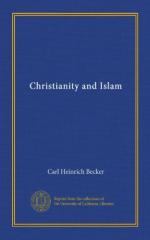Medina: they were excluded from political life
when the capital was transferred from Medina to Damascus
and were left in peace to elaborate their theory of
the Muhammedan divine polity. The influence of
these groups was paramount: but of almost equal
importance was the influence of the proselytes in the
conquered lands who were Christians for the most part
and for that reason far above their Arab contemporaries
in respect of intellectual training and culture.
We find that the details of jurisprudence, dogma, and
mysticism can only be explained by reference to Christian
stimulus, nor is it any exaggeration to ascribe the
further development of Muhammed’s views to the
influence of thinkers who regarded the religious polity
of Islam as the realisation of an ideal which Christianity
had hitherto vainly striven to attain. This ideal
was the supremacy of religion over life and all its
activities, over the state and the individual alike.
But it was a religion primarily concerned with the
next world, where alone real worth was to be found.
Earthly life was a pilgrimage to be performed and
earthly intentions had no place with heavenly.
The joy of life which the ancient world had known,
art, music and culture, all were rejected or valued
only as aids to religion. Human action was judged
with reference only to its appraisement in the life
to come. That ascetic spirit was paramount, which
had enchained the Christian world, that renunciation
of secular affairs which explains the peculiar methods
by which mediaeval views of life found expression.
Asceticism did not disturb the course of life as a
whole. It might condemn but it could not suppress
the natural impulse of man to propagate his race:
it might hamper economic forces, but it could not
destroy them. It eventually led to a compromise
in every department of life, but for centuries it
retained its domination over men’s minds and
to some material extent over their actions.
Such was the environment in which Islam was planted:
its deepest roots had been fertilised with Christian
theory, and in spite of Muhammed’s call to repentance,
its most characteristic manifestations were somewhat
worldly and non-ascetic. “Islam knows not
monasticism” says the tradition which this tendency
produced. The most important compromise of all,
that with life, which Christianity only secured by
gradual steps, had been already attained for Islam
by Muhammed himself and was included in the course
of his development. As Islam now entered the
Christian world, it was forced to pass through this
process of development once more. At the outset
it was permeated with the idea of Christian asceticism,
to which an inevitable opposition arose, and found
expression in such statements as that already quoted.
But Muhammed’s preaching had obviously striven
to honour the future life by painting the actual world
in the gloomiest colours, and the material optimism
of the secular-minded was unable to check the advance




